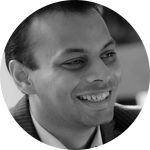Three People. Two Questions. One Degree. – Focus on Technology & Innovation
Our Master of International Business alumni step out of Fletcher into fascinating careers across sectors and geographies. Our new series, “Three People. Two Questions. One Degree.” features MIB alumni working in a common industry who bring a unique Fletcher perspective to their organizations. Through a pair of questions, they look back at their time at Fletcher and forward to the future.
THREE PEOPLE
 Shailesh Chitnis ‘10 Compile Vice President of Marketing Bangalore, India |  Sarah Ryan ‘13 SONOS Global Commercial Insights Boston, MA |  David Rottblatt ‘11 Embraer Business Development Director San Francisco, CA |
TWO QUESTIONS
- What did you learn at Fletcher that is most relevant to your career today?
- What innovation do you think will impact businesses most over the next 5 to 10 years?
Shailesh Chitnis ’10 – Compile
When deciding on a graduate school, we tend to focus on the tangibles, such as courses offered and alumni network. In hindsight, I realize that the biggest skill I learned at Fletcher was something more nebulous but far more impactful: being comfortable with uncertainty. In the real-world, problems rarely fit a particular domain or pattern. Succeeding in such an environment requires a universal mindset. Being able to engage with the wide-ranging group of people you meet at Fletcher forces you to remove your “graduate school blinders”. And that perspective is priceless.
Looking ahead, the coming wave of AI has the potential to disrupt most industries. In fact, a recent study by McKinsey posits that 5% of today’s jobs will be fully automated and a 100 % of all jobs will have portions of their tasks automated. The sectors that seem ripe for this digital disruption are those that have a high percentage of predictive or repetitive components. These include manufacturing, transportation, agriculture, and mining. Sectors that have a high level of emotional or human interaction, like healthcare services or people management, appear to be further away from automation.
And while automation’s benefits to the economy are self-evident, from increased productivity to faster innovation, we have to consider the social challenges. Namely, reskilling those whose jobs have been “automated” away and the distributional issues with outsized winners.
Sarah Ryan ’16 – SONOS
For the Fletcher students of tomorrow, I say, don’t be afraid to take risks and pursue what interests you. And, embrace data. It is powerful!
Post-Fletcher, I’ve worked in global strategic roles at consumer-facing brands. In my work, I consistently leverage the macro approach to problem-solving that I honed in the MIB program. At Fletcher, I was privileged to work on projects with real clients, delivering data-driven approaches to market prioritization and the assessment of global digital trends. Along with my coursework, these projects provided ample practice in data modeling, analysis, and effective communication of findings and recommendations. This was a great foundation for the type of work I do today.
Beyond my own work on the data side of the industry, consumers are already experiencing the impact of voice technology in the home. With Google and Amazon battling for unit share, voice-enabled devices have dropped in price and the household penetration of voice assistants is growing at an astronomical rate. Retail and the ways that consumers purchase will continue to be disrupted by artificial intelligence and the interaction between smart devices. Brands that are not anticipating these changes will be left behind.
David Rottblatt ‘11 – Embraer
Professor Rusty Tunnard taught me a lot about navigating ambiguity to provide clarity when solving a tough problem. His consulting class teaches you how to deliver a professional product in a short amount of time. By learning how to be resourceful with a new team, especially when a path to success is not evident, you become comfortable “being uncomfortable.” Since leaving Fletcher, I have been chosen to tackle some of the most difficult challenges my employer or team faced at the time, and the ability to start from scratch and chart a course forward is an invaluable skill that will help my career until the day I retire.
Being able to adapt and look ahead, you can provide value to organizations that may also “be uncomfortable” with the changes coming to their industry. I believe the most impactful short-term innovation is the sharing economy. The shift from being “asset heavy” to “asset light” will continue to disrupt major businesses, as Uber and Airbnb have done to the taxi and hotel industry. This reflects a meaningful change in consumer behavior. Buyers today want experiences, not a heavy balance sheet. They want to be flexible and un-committed. If companies pivot to meet the new expectation of connecting “renter” and “provider” instead of “buyer” and seller,” they will be successful in meeting and exceeding the needs of today’s market.
